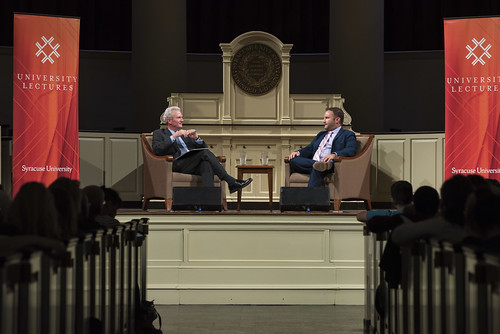NPR host David Greene talks objectivity and fake news at University Lecture
October 4, 2017
NPR "Morning Edition" and "Up First" podcast host David Greene spoke in Hendricks Chapel Tuesday night on topics ranging from his proudest moments in journalism to the lack of sleep he gets to fake news.
Greene was introduced to the crowd with a long list of accolades and a brief history of his career. He spent seven years as a reporter for the Baltimore Sun before moving to NPR in 2005. For NPR, he has been a foreign correspondent based in Moscow and has also spent time working in Libya. He became a familiar voice to NPR’s most dedicated listeners as he spent four years covering George W. Bush’s second term in the White House.

During his time in Hendricks, he answered questions from Grant Reeher, a political science professor in the Maxwell School of Citizenship and Public Affairs. Greene returned to the theme of using journalism to expose the truth and keep the world honest several times in those answers.
He received a mid-speech applause when he made the bold statement, “Our job as journalists is to report the truth and challenge public officials to recognize truth.”
During his discussion of what truth is when it comes to the media, Greene said there is definitely a balance between being a journalist and being a human being. He then reminisced on covering 9/11 and said that on that day, he fell into a hardcore journalistic mode, delivering the facts and keeping calm. Soon after, though, once he made it to a bar and watched footage of bodies falling from the towers, he said he broke down in the arms of the bartender.
Greene was quick to follow this by saying there is no excuse for a journalist to infuse their opinions into their work. He said when he sits down to do a story, he always acknowledges he has his own experiences and biases but does his best to listen to the person he is interviewing and put himself in their shoes. Greene said despite claims that NPR tends to swing left, he believes the outlet does a good job balancing points of view.
“I don’t think we can make ourselves into something we are not,” Greene said. “Do I have passions and thoughts and experiences that shape my world view? Of course I do. And to say I don’t would be crazy, but that doesn’t need to reflect in my work.”
John Smith, the Morning Edition co-host for WAER at Syracuse University, was in the audience Tuesday and said he has always admired Greene’s interviewing techniques. He echoed Greene and said that NPR does a good job giving listeners both sides of the story, something, he feels was seen during the last election cycle. What struck him about Greene’s speech, Smith said, was his dedication to deliver the news honestly.
“He feels honored to deliver the news to the public in a way that carries an importance of being a great communicator and being as honest and forthright as possible,” Smith said. “I think that spoke to his journalistic integrity, something we all hope to always carry with us.”
(Photo: James Sprankle)
After a long build up, Reeher asked a question about fake news and the public’s current perception of the media. Greene said the problem is two fold: Some outlets take too much liberty at the news desk to share their own opinions and a portion of the public believes social media and other non-serious publications are reliable news. Social media, Greene said, while great for a news organization to use for promoting stories, should not been seen as a dependable place to gather all of one’s information.
When asked if he was disheartened by fake news, Greene said yes, admitting this was one of the easiest questions to answer throughout the talk. He elaborated by saying it is hard as a journalist to watch people mislabel and misinterpret what news is and attack the true outlets for not doing their job correctly.
Elisa Oberst, an exchange student at Syracuse University from Germany, said she was inspired to hear such a prominent figure in the media continue to support the field she is studying despite the public's current view of it.
“I think that it is good to hear there is a person behind the story and to hear someone so high up in the industry admit that he still had his own personal views,” Oberst said. “But it is so important that he said he puts this all behind him when he is reporting and only focuses on the facts and what sources tell him. I believe that is a key skill for journalists to maintain.”
More by this author
Popular tags on recent stories
By visiting this site, you agree to the Terms of Use
Produced by S.I. Newhouse School of Public Communications,
Syracuse University, 215 University Place, Syracuse, NY 13244







Post new comment